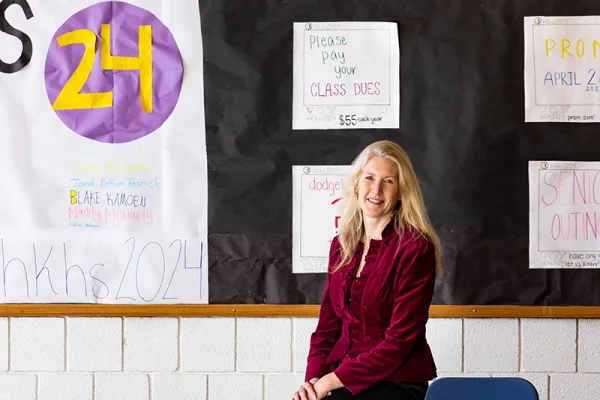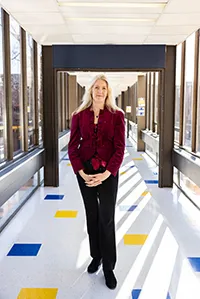Public Education Doesn’t Get Enough Respect
Alum News
Donna Hayward ’91, M.A.T. ’93—the 2023 National Principal of the Year—is determined to change that.
Published March 25, 2023
During her sophomore year at Smith, Donna Hayward ’91, M.A.T. ’93, received an unexpected phone call from her former math teacher at South Royalton High School in Royalton, Vermont. Would she be interested in subbing for him while he spent the last month of the term in Ireland? Hayward, who had just switched her major from math to philosophy, figured why not? She would be home for summer break by then anyway, and the thought of seeing some of her friends back at her hometown high school sounded like fun.
“Keep in mind, I grew up in a small town,” she says, “so everybody knows everybody. Some of my friends were still in school. When you have a graduating class of 40, you make friends with everybody.”
Now, more than 30 years after that first foray to the head of a classroom, Hayward is one of the country’s leading voices for public education. Last fall, after a rigorous search, she was named National Principal of the Year by the National Association of Secondary School Principals (NASSP). Ronn Nozoe, the CEO of NASSP, says Hayward “has a knack for inspiring students and staff alike. When you walk into her office, you can’t help but feel motivated by her positive energy and commitment to her school community. She’s great at using her sense of humor to build individual relationships and a close-knit school culture. But at the same time, she’s not afraid to tackle the tough problems and make the difficult decisions all school leaders inevitably face. She’s the kind of leader who makes you want to be a better student, educator, and human being.”
For Hayward, the distinction has provided a powerful platform from which to share her message about the need to support teachers and students at a time when curricula are being scrutinized and school resources are being stretched thin. “I am a public school advocate. Our public school opportunities for kids across the entire country are what we all have in common,” she says. “We need to invest and reinvest in our public schools because that’s an investment that never declines in value. You’re paying it forward, improving your town, and improving the quality of your life.”
Hayward wasn’t always convinced that she was destined for a career in education. Though she remembers having a “blast” teaching math that summer of her sophomore year, the experience wasn’t enough to compel her to think of teaching as anything other than a one-time opportunity. That changed a couple of years later, when she was back home after graduating from Smith and wondering whether applying to law school was the right next step. That’s when fate intervened.
“We need to invest and reinvest in our public schools because that’s an investment that never declines in value. You’re paying it forward, improving your town, and improving the quality of your life.”
In the early 1990s, there was a shortage of female math teachers. Since Hayward had ended up minoring in math, Smith College invited her back to campus, offering her a spot in its master of arts in teaching program—at no cost—if she agreed to teach math for at least three years after earning her degree. “I went because that was my path,” she says.
The experience—as well as the teaching jobs that followed—ignited a passion for public education that has stayed with Hayward ever since, taking her from entry-level teaching positions to leadership roles in schools across Connecticut, with accolades all along the way. “I loved teaching, loved the classroom,” she says. “But I always knew that once I chose education, I really chose educational leadership.”
Knowing her strengths has paid off. In 2014, for example, she became principal of Haddam-Killingworth High School (HKHS) in Higganum, Connecticut. Under her direction, HKHS was named a School of Distinction by the State of Connecticut, appeared on Newsweek’s list of America’s Top High Schools for three years in a row, and, in 2018, was named a U.S. Department of Education National Blue Ribbon School.
Hayward traces her own educational philosophy—to do everything possible to ensure students are successful—back to a beloved high school principal. Bill Pollock left South Royalton High School at the end of Hayward’s junior year to build a pre-K–4 school in Kuwait, a process that took several years. He flew home the day before Iraq invaded Kuwait and subsequently destroyed the school. But when the war was over, he went back and rebuilt the school. “That is serious drive,” Hayward says, “and that’s a calling.” Hayward wrote to him for advice when she decided to go into education administration. His response? “You’ve got to be in it—be in the cafeteria, ride the school bus with the kids, be in the classrooms, live alongside them.”
“There’s a general lesser regard for teaching, teachers, and educators now than there has been historically,” she says.
As principal of the year, Hayward will spend her term serving as a spokesperson for principals around the country and as a speaker at various events. One of her priorities is to advance a national discussion about the profound changes students, teachers, and administrators have experienced over the past several years. “I’ve been an administrator for 25 years, and the expectations for principals have changed dramatically,” she says. She points to factors like COVID-19, social media, and school violence as major obstacles to education.
While HKHS has numerous protocols in place to keep students safe from physical and emotional harm, social media has no boundaries and is a constant source of concern for educators. “Like politicians, educators have essentially no rights when it comes to being attacked on social media,” Hayward says. “It’s common for teachers, principals, and coaches to be defamed in this public arena. These social media posts can be from someone who has nothing to do with your school, who just wants to take a cheap shot, and often include information that is not true or misinformed.”
Meanwhile, the pandemic and subsequent school shutdowns resulted in learning loss and residual mental health issues. “We are having to reteach students how to do school, stick to deadlines, and show up every day,” Hayward says. “They are relearning how to be good students.”
As Hayward advocates for the value of public education, she also hopes to increase respect for those who choose it as a career. “There’s a general lesser regard for teaching, teachers, and educators now than there has been historically,” she says. She cites a current shortage of teachers that may only worsen due to a lack of respect for the profession, school safety issues, and low pay. “What happens if this generation of educators rides off into the sunset, and they can’t staff our schools?” Hayward asks. “I think we need to start talking about [these issues] at every opportunity we have—not only with our friends and family but also with national politicians, state government officials, and local legislators.”
Cheryl Dellecese is a senior editor at Smith.
The article appears in the Spring 2023 issue of the Smith Alumnae Quarterly.
Pop Quiz
A look back at a future principal’s teen years—and how she sees young people today.
Go-to cool look as a teen
Jeans and a polo shirt.
Favorite “high school movie”
Ferris Bueller’s Day Off, of course!
First job
At a little general store in my hometown. We could eat all the penny candy we wanted. Statistically speaking, I should have no teeth left.
Favorite book as a teen
All the Judy Blume books.
Favorite music
I’m an ’80s child and am still a (mostly closet) fan of the music: Billy Joel, Elton John, Queen, Madonna …
Most trouble you ever found yourself in as a teenager
I didn’t, despite my best efforts. When I was a senior, I wanted a detention slip for my “memory book,” but I didn’t have the reputation as a troublemaker. My best friend and I failed miserably at earning detention even though we did plenty of things to try to garner the coveted slip. How embarrassing!
Most important thing teenagers need
At least one adult person who deeply cares about them.
Most important thing teachers need?
Time. Always, time.
Best advice for parents of high school students
Listen to them! The message delivery may be rough in the teen years, and you may have to look past the moods and eye-rolling, but try very hard to hear what your kids are saying to you.
Teaching is cool because
It’s the noblest profession in the world. You get to see the benefits of your work walk back in the door and say “thank you.”
Lesson learned at Smith
How to navigate the world as a strong woman. I’m almost getting the hang of it.
Best thing about being a principal
The feeling I get walking off the graduation field with my faculty when we know we’ve somehow managed to stick the landing again.
Photographs by Jessica Scranton

